Notes
- ↑ Resigned in 2009, became the Prime Minister of Latvia following the resignation of Ivars Godmanis. Replaced by Liene Liepiņa on 19 March 2009.
| Members of the European Parliament for Latvia | |
|---|---|
| Observers | (2003) |
| Delegation | (2004) |
| 6th term | (2004) |
| 7th term | (2009) |
| 8th term | (2014) |
| 9th term | (2019) |
This is the list of the 9 members of the European Parliament for Latvia in the 2004 to 2009 session.
| National party | EP Group | Seats | ± |
|---|---|---|---|
| For Fatherland and Freedom/LNNK | UEN | 4 / 9 | |
| New Era Party | EPP–ED | 2 / 9 | |
| For Human Rights in United Latvia | G–EFA | 1 / 9 | |
| People's Party | EPP–ED | 1 / 9 | |
| Latvian Way | ALDE | 1 / 9 |

Latvia, officially the Republic of Latvia, is a country in the Baltic region of Northern Europe. It is one of the Baltic states. It borders Estonia to the north, Lithuania to the south, Russia to the east, and Belarus to the southeast and shares a maritime border with Sweden to the west. Latvia covers an area of 64,589 km2 (24,938 sq mi), with a population of 1.9 million. The country has a temperate seasonal climate. Its capital and largest city is Riga. Latvians belong to the ethno-linguistic group of the Balts and speak Latvian, one of the only two surviving Baltic languages. Russians are the most prominent minority in the country, at almost a quarter of the population.

The politics of Latvia takes place in a framework of a parliamentary representative democratic republic, whereby the Prime Minister is the head of government, and of a multi-party system. The President holds a primarily ceremonial role as Head of State. Executive power is exercised by the government. Legislative power is vested in both the government and parliament, the Saeima. The Judiciary is independent of the executive and the legislature. The Economist Intelligence Unit rated Latvia a "flawed democracy" in 2022.

The economy of Latvia is an open economy in Europe and is part of the European Single Market. Latvia is a member of the World Trade Organization (WTO) since 1999, a member of the European Union since 2004, a member of the Eurozone since 2014 and a member of the OECD since 2016. Latvia is ranked the 14th in the world by the Ease of Doing Business Index prepared by the World Bank Group. According to the Human Development Report 2011, Latvia belongs to the group of very high human development countries. Due to its geographical location, transit services are highly developed, along with timber and wood processing, agriculture and food products, and manufacturing of machinery and electronic devices.

Foreign relations of Latvia are the primary responsibility of the Ministry of Foreign Affairs. Today's Republic of Latvia regards itself as a continuation of the 1918–1940 republic. After the declaration on the restoration of its full independence on August 21, 1991, Latvia became a member of the United Nations on September 17, 1991, and is a signatory to a number of UN organizations and other international agreements. Latvia welcomes further cooperation and integration with NATO, European Union, OECD and other Western organizations. It also seeks more active participation in UN peacekeeping efforts worldwide.
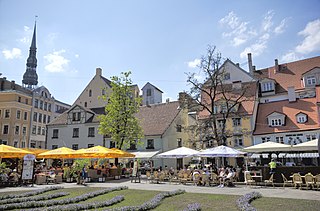
Riga is the capital and largest city of Latvia and is largest city in the Baltic states, and is home to 605,802 inhabitants which is a third of Latvia's population. The population of Riga metropolitan area, which stretches beyond the city limits, is estimated at 860,142. The city lies on the Gulf of Riga at the mouth of the Daugava river where it meets the Baltic Sea. Riga's territory covers 307.17 km2 (118.60 sq mi) and lies 1–10 m (3.3–32.8 ft) above sea level, on a flat and sandy plain.
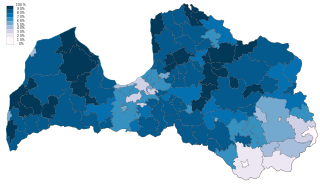
The Latvian language, also known as Lettish, is an Eastern Baltic language belonging to the Baltic branch of the Indo-European language family, spoken in the Baltic region. It is the language of Latvians and the official language of Latvia as well as one of the official languages of the European Union. There are about 1.2 million native Latvian speakers in Latvia and 100,000 abroad. Altogether, 2 million, or 80% of the population of Latvia, spoke Latvian in the 2000s, before the total number of inhabitants of Latvia slipped to less than 1.9 million in 2022. Of those, around 1.16 million or 62% of Latvia's population used it as their primary language at home, though excluding the Latgale region it is spoken as a native language in villages and towns by over 90% of the population.

The Baltic states or the Baltic countries is a geopolitical term, which currently is used to group three countries: Estonia, Latvia, and Lithuania. All three countries are members of NATO, the European Union, the Eurozone, and the OECD. The three sovereign states on the eastern coast of the Baltic Sea are sometimes referred to as the "Baltic nations", less often and in historical circumstances also as the "Baltic republics", the "Baltic lands", or simply the Baltics.

Daugavpils is a state city in south-eastern Latvia, located on the banks of the Daugava River, from which the city gets its name. The parts of the city north of the river belong to the historical Latvian region of Latgale, and those to the south lie in Selonia. It is the second-largest city in the country after the capital Riga, which is located some 230 kilometres to its north-west.

Latvians are a Baltic ethnic group and nation native to Latvia and the immediate geographical region, the Baltics. They are occasionally also referred to as Letts, especially in older bibliography. Latvians share a common Latvian language, culture, history and ancestry.

The national flag of Latvia was used by independent Latvia from 1918 until the country was occupied by the Soviet Union in 1940. Its use was suppressed during Soviet rule. On 27 February 1990, shortly before the country regained its independence, the Latvian government re-adopted the traditional red-white-red flag.

FK Ventspils is a Latvian football club, based at Ventspils Olimpiskais Stadions in Ventspils city and is one of the most popular football clubs in the country. The club played in the Latvian Virsliga since 1997. It was abolished in 2020, but has since returned to Latvian football and competes in the Latvian First League as of 2023.
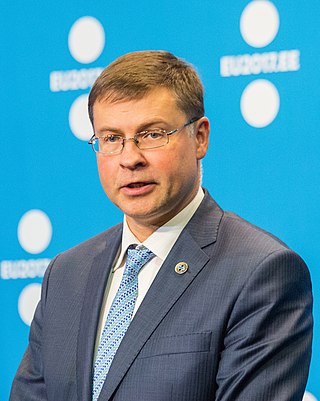
Valdis Dombrovskis is a Latvian politician serving as Executive Vice President of the European Commission for An Economy that Works for People since 2019 and European Commissioner for Trade since 2020. He previously served as European Commissioner for Financial Stability, Financial Services and Capital Markets Union from 2016 to 2020 and Prime Minister of Latvia from 2009 to 2014.

Latvia has participated in the Eurovision Song Contest 23 times since making its debut at the contest in 2000, where the group Brainstorm finished third with the song "My Star". Latvia won the contest in 2002, with Marie N and the song "I Wanna", defeating Malta by 12 points. Latvia is the second former Soviet country to win the contest. The 2003 contest was held in the Latvian capital Riga. The country achieved its third top 10 result in 2005, when Walters and Kazha finished fifth with "The War Is Not Over".

FK Jelgava is a Latvian football club that is based in Jelgava. The club plays its home-matches at the Zemgales Olimpiskais Sporta Centrs stadium with capacity of 1,560 people .
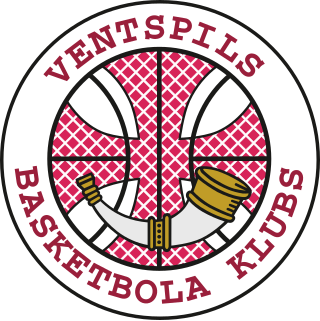
BK Ventspils is a professional basketball club that is located in Ventspils, Latvia. The club competes in the Latvian-Estonian Basketball League.
An election of the delegation from Latvia to the European Parliament was held on 6 June 2009. Seventeen lists containing a total of 185 candidates were registered for the election.
Latvia participated in the Eurovision Song Contest 2009 with the song "Probka" written by Kārlis Lācis, Jānis Elsbergs and Sergejs Timofejevs. The song was performed by Intars Busulis. The Latvian broadcaster Latvijas Televīzija (LTV) organised the national final Eirodziesma 2009 in order to select the Latvian entry for the 2009 contest in Moscow, Russia. Twenty songs were selected to compete in the national final, which consisted of two shows: a semi-final and a final. In the semi-final, ten entries were selected to advance based on a public vote. Ten songs ultimately qualified to compete in the final on 28 February 2009 where two rounds of voting by the public and a five-member jury panel selected "Sastrēgums" performed by Intars Busulis as the winner. The song was later translated from Latvian to Russian for the Eurovision Song Contest and was titled "Probka".
Latvian Higher League 2009 was the 18th season of top-tier football in Latvia. It began on 14 March 2009 with the first round of games and ended on 8 November 2009 with the 36th round of matches. Ventspils were the defending champions.
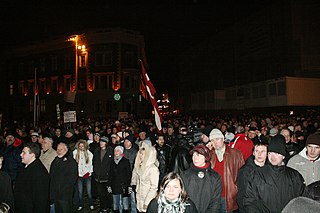
The 2008 Latvian financial crisis, which stemmed from the global financial crisis of 2008–2009, was a major economic and political crisis in Latvia. The crisis was generated when an easy credit market burst, resulting in an unemployment crisis, along with the bankruptcy of many companies. Since 2010, economic activity has recovered and Latvia's economic growth rate was the fastest among the EU member states in the first three quarters of 2012.
The current administrative division of Latvia came into force on 1 July 2021.